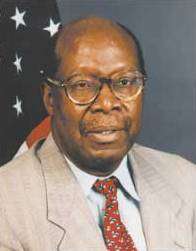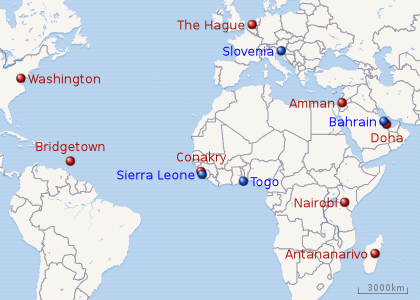Johnny Young (diplomat)
Johnny Young (born 1940) is a former United States Foreign Service officer and ambassador, having been posted to North and South America, Europe, Africa, and Asia during his 37 years therewith.
Johnny Young | |
|---|---|
 US State Department photo of Young (2002) | |
| Born | 1940 (age 79–80) |
| Alma mater | Temple University |
| Years active | 1967–2004 |
| Employer | US Department of State |
| Title | Career Ambassador |
| United States Ambassador to Slovenia | |
| In office October 24, 2001 – September 17, 2004 | |
| President | George W. Bush |
| Preceded by | Nancy Halliday Ely-Raphel |
| Succeeded by | Thomas Bolling Robertson |
| United States Ambassador to Bahrain | |
| In office December 11, 1997 – September 29, 2001 | |
| President | Bill Clinton George W. Bush |
| Preceded by | David M. Ransom |
| Succeeded by | Ronald E. Neumann |
| United States Ambassador to Togo | |
| In office October 7, 1994 – November 21, 1997 | |
| President | Bill Clinton |
| Preceded by | Harmon Elwood Kirby |
| Succeeded by | Brenda Schoonover |
| United States Ambassador to Sierra Leone | |
| In office November 29, 1989 – July 23, 1992 | |
| President | George H. W. Bush |
| Preceded by | Cynthia Shepard Perry |
| Succeeded by | Lauralee M. Peters |
| Personal details | |
| Awards | |
Personal life
A resident of both Maryland and Pennsylvania, Johnny Young was born in 1940.[1] He received a bachelor's degree (magna cum laude) from Temple University.[2] As of November 22, 1970, Young was married and expecting his first son.[3]
Career
Foreign Service
 |
| Foreign Service assignments (ambassadorships in blue) |
Johnny Young joined the United States Foreign Service as an officer in 1967.[4] He first worked as a budget and fiscal officer in Antananarivo, Madagascar until 1970. For two years he was the supervisory general services officer in Conakry, Guinea[2] (during Portugal's Operation Green Sea)[3] before doing the same in Nairobi, Kenya from 1972–1974. From Africa, Young transferred to Doha, Qatar, where he first served as chargé d'affaires. After another overseas assignment to Bridgetown, Barbados, Young returned to the US in 1979 to work in the Foreign Service's Washington, D.C. Bureau of Personnel and Office of the Inspector General. In 1983, Young left the States to serve in Amman, Jordan for two years before moving on to The Hague, Netherlands.[2]
From 1989–2004, Young was an ambassador extraordinary and plenipotentiary.[1] Assigned to Sierra Leone from November 29, 1989 – July 23, 1992, Young succeeded Cynthia Shepard Perry and was himself succeeded by Lauralee M. Peters.[5] Young presented his credentials as Ambassafor to Togo on October 7, 1994, taking the office recently left by Harmon Elwood Kirby; when Young left on November 21, 1997, he would be replaced by Brenda Schoonover.[6] As Ambassador to Bahrain (December 11, 1997 to September 29, 2001), Young was filling the shoes of David M. Ransom; when Young left, Ronald E. Neumann filled his role the following month.[7] Young's final ambassadorial assignment was to Slovenia from October 24, 2001 – September 17, 2004; Young took the office after it was vacated by Nancy Halliday Ely-Raphel, and Thomas Bolling Robertson took it from Young[8] after the latter retired.[4]
While working for the Foreign Service, Young participated in Operation Sharp Edge and the evacuation of US civilians in Freetown after Valentine Strasser's coup d'état. He also received performance-based cash awards, a Superior Honor Award, a Meritorious Honor Award, and two Group Honor Awards.[2] On October 12, 2004, Young was appointed as a Senior Foreign Service Career Ambassador.[1]
Post-government
After his retirement from government service, Young worked as a consultant, a lecturer, and the executive director of the United States Conference of Catholic Bishops' Migration and Refugee Services Division from 2007 through at least 2013. In 2013, Young also self-published the autobiographical From The Projects to the Palace: A Diplomat's Unlikely Journey from the Bottom to the Top; printed by Xlibris and selling for US$19.99 (equivalent to $21.94 in 2019), it tells Young's story from childhood through his diplomatic career.[4]
References
- "Johnny Young". United States Department of State. Archived from the original on May 28, 2019. Retrieved August 8, 2020.
- "Young, Johnny". United States Department of State. November 9, 2001. Archived from the original on November 28, 2017. Retrieved August 8, 2020.
- "Witness History: Portugal Attacks Guinea" (streaming audio). BBC. November 29, 2013. Archived from the original on August 8, 2020. Retrieved August 8, 2020.
- Maitra, Susan B. (2013). "Books by Foreign Service Authors - 2013". American Foreign Service Association. Archived from the original on July 30, 2020. Retrieved August 8, 2020.
We are pleased to present this year's roundup of books by members of the Foreign Service community.
- "Chiefs of Mission for Sierra Leone". United States Department of State. Archived from the original on July 22, 2020. Retrieved August 8, 2020.
- "Chiefs of Mission for Togo". United States Department of State. Archived from the original on January 3, 2020. Retrieved August 8, 2020.
- "Chiefs of Mission for Bahrain". United States Department of State. Archived from the original on November 18, 2019. Retrieved August 8, 2020.
- "Chiefs of Mission for Slovenia". United States Department of State. Archived from the original on August 20, 2019. Retrieved August 8, 2020.